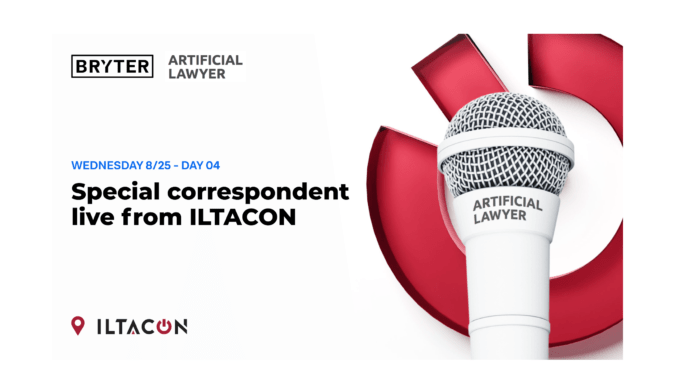
This is the third and final BRYTER special report on ILTACON 2021 for Artificial Lawyer, covering Day 4.
Most conferences only really go for two days at most, with perhaps an additional pre-event evening for drinks. But, with a fourth day, ILTACON is already into extra time and it hasn’t slowed down. As we have mentioned before, ILTA has a strong community and many of the participants who have come are part of it, so there is little visible drop-off in activity.
While Days 2 and 3 focused substantially on technology and processes, Day 4 topics are mostly based on people, teams and best practices. Several tracks also focused on single issues and took the form of ‘how-tos’ for known and regular problem use cases.
We attended sessions on data literacy, using external data sources to power analytics, and how to make key information available proactively.
In the session ‘Push, Don’t Pull: Delivering Key Information to Attorneys Before They Ask’, speakers Kate Orr (Orrick, Herrington & Sutcliffe), Kelly Twigger (ESI Attorneys), Ryan Anderson (Filevine) and Samuel Whitman (Mayer Brown) discussed a mindset shift away from making information available to be sought by lawyers, to instead pushing that information to them proactively, and some best practices for achieving this.
Another talk, ‘Data Literacy for your Company: A Critical Skill for the 21st Century‘ (presented by Mary Vacherweill, ILTACON Planning Committee and Sr. Technology Specialist, Faber Daeufer & Itrato; and Tim Fox, Director, Practice Intelligence and Analytics, Ogletree, Deakins, Nash, Smoak & Stewart), explored a number of ways that data literacy can be greatly beneficial in improving legal service business operations. These topics and the others presented today left space for discussion and sharing, and it has also been great to see a focus on diversity, equity and belonging.
We had the chance to catch up with several community members throughout the week, and have been asking everyone about their most relevant success stories and what trends they are seeing take shape. While answers were naturally diverse, patterns still emerged. We have heard about the consistent relevance and increasing maturity of machine learning both in discovery and text extraction, as well as the shaping of more full-platform, ‘end-to-end’ offerings that are seeing greater adoption.
Mary Vareberg (Manager of Procurement, Robins Kaplan), told us about her experience of the event: ‘My biggest takeaway is having open conversations where everyone is trying to help each other in the field without any motivation towards furthering their own business. Instead, we are all truly trying to help each other, suggesting best practices around everything from IT to processes.’
Mary spoke in a session on Tuesday called ‘Contract Lifecycle Management: Success Stories’. She chose to highlight this subject to help firms recognise the importance of their data: ‘CLM is important because I believe firms are not realising how much money they are losing due to the fact that they don’t have visibility into the depth and breadth of their contractual data and terms. Firms can make quick benefits from having tighter processes and better systems around it.’
We have also noticed that both law firms and corporate legal departments have become more educated and had positive and relevant experiences with technology, and budgets have been made available or increased.
This virtuous circle leaves more room for more adoption – and more horizontal, full-service applications are having their time, which might be another reason for the increased interest in contract lifecycle management solutions. One thing is clearly the consequence: consolidation in the market.

With the organisation and standardisation of processes and tasks and the introduction of more repository systems like document, matter and intake management systems, the ground is fertile for the next level: automation. Nikki Shaver (Managing Director, Innovation and Knowledge at Paul Hastings) described the change in uptake like this: ‘After years of preparation, automation is emerging from pilots and PoCs to be part of a law firm’s strategy. And with this comes new requirements for training, management, and even hiring, that in turn now shapes the requirements of legal teams.’
This is a recurring topic that many report: Most firms and in-house teams have investigated automation approaches in recent years and have numerous applications running, but numbers are still in the 10s, not in the 100s. Automation has not reached the strategic decision maker level everywhere yet, but there is a lot of headroom, and we can expect the market to pick up growth now.
Legal Operations has created fertile ground for next steps. Chris Emerson (Senior Director of Legal Operations and Innovation at Quarles & Brady) emphasised the necessary groundwork around processes and structural approaches beyond the hype. In his words: ‘If you don’t operationalise your innovation efforts, you’re at a net loss. Anyone can do something one time, but it’s really when you do it two, three times and then more – that’s when you achieve return on your investment.’
And that wraps up our reporting of a successful and worthwhile event. BRYTER will be back at ILTACON next year and we hope to see you all there!
—
Many thanks to Michael and the BRYTER team for their reports from Las Vegas. And hopefully Artificial Lawyer will be there in-person next year as well – as this year it was not possible to attend because of COVID travel restrictions from the UK to the US, which also hopefully will come to an end soon.